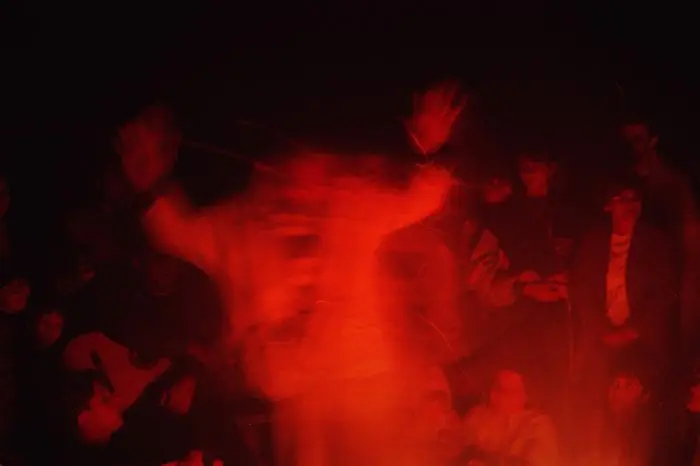Vaklush Tolev (1923-2013) was a Bulgarian theologian, public figure, sage, and spiritual Teacher, author of numerous works on religious-philosophical and cultural-historical topics. After the political changes, for several years he lectured on the history and theory of religions at Plovdiv and Sofia Universities, as well as in various cultural centers across the country. He is the author of the repeatedly reprinted book “History of Religions“, whose first edition (1992) was approved by the Ministry of Education as educational support literature for philosophy-related subjects.
This material is a collection of questions from interviews with Vaklush Tolev by various journalists from different media, covering between 1990-2010 a topic that today again is on the agenda in Bulgarian society – the topic of teaching religion in schools.
Question: How would you comment on the ideas of teaching religion in school? Should young people be introduced to religion?
Answer: In history, we have the accompaniment of two institutions – the throne and the altar, i.e., state and church. We know them both as partners and as enemies. Both institutions define the face and character of society. However, school is not a place for conviction but for knowledge.
The role of school by its purpose is to provide education for knowledge and, if possible, education in behavior. The tragedy is when the school harmonizes knowledge with ideologies. Then one ideology may deny, another may accept. That is why the world is divided into allowed and forbidden. Because one ideology allows something, the other denies it. Then school is left with one task. Just as an ethical subject is established with ethical purposes, such as ethics (which educates the person), one ray of that ethical path can be directed toward religious education.
Question: Do you accept that religious education should be taught in schools? And on what principle, if yes? Should it be mandatory?
Answer: Religious education was taught in Bulgarian general education schools, in so-called progymnasiums, long before 1930. Much later, something like the history of religions was introduced in high schools, from about 1941-2 to 1945. But religious education studied in the progymnasiums is the most banal form of religious traditionalism. You cannot give it metaphysical knowledge, nor dogmatic, except religious-traditional, teaching children from first grade how to make the sign of the cross and to give a candle. But when a person matures, no matter how fruitful the tree of this knowledge was, a new breeze for the need for metaphysical knowledge will uproot all its fruits. Then he will seek something else. We must not deprive a person of insight into belonging to the spiritual!
I am horrified when people say: “Let’s bring back traditions!” What does it mean to bring back traditions when it concerns the virtues and moral values of Christianity? That all of Europe is built upon this and our history is built from 865 AD to the present on Christian values. Was there any other culture in Europe besides these values? And are they foreign to others? I fear the stubbornness of thought that becomes the pillow of clergy.
So, religious education should be introduced in high schools. Fine, it is proposed to be optionable. Why? Because in constitutions and modern times the so-called affiliations have changed as national essence and religious confession. The idea of the universal free person is emerging.
Psychology of religion would be more appropriate to establish. Not simply Adam-Eve’s paradise birth…
We must teach the person universal values that undoubtedly as a moral gradation change, rather than hammer the nail and hang the cassock there. And with that, preserve tradition. Then we deny Christ who made a change to Judaism!
In these lessons, which can be included in the school curriculum, these things cannot be mandatory but, as I say, an optionable facultative form. Then only for themselves the elective education in high schools will of course give priority to our Christian confession. In one high school, there will be no more than five people professing certain sects. But in one high school, facultatively, with parental concern, there will be two hundred or three hundred.
There are also so-called Sunday schools, where education in this sense takes place – when they do not introduce the history of the Teaching about Christ and His virtues, which are required of man, but education for the wholeness of the person in service to God and to their fellow man. These are voluntary gatherings on Sundays, where some church organizes lessons for its faithful, for the children of its faithful. Books have been published – Sunday schools or Christian schools.
Sunday schools are the privilege of the church. But what is called the parish sends 20 children, then those run away because they do not have even facultative obligation – those who enroll should calmly complete their course. That is why Sunday schools do not succeed. The second thing – education is banalized! Excuse me, fathers, but it is banalized with primitiveness. Look, the culture of our children is now 100 percent stronger, broader than what it was 15-20 years ago. Why? You have direct education from television and radio. A primer that could be given to you with a textbook or a magazine “Little Christian” can no longer play this fatal role in education, as can television.
Question: Would there be a place in this study of religion – besides the interpretation of gospel texts – to connect it with scientific achievements, with the development of human capabilities and their manifestation in art, with a broader knowledge?
Answer: Look, this probably cannot be done by unprepared people, but those who can teach religious education… We are not talking about religion in its full scale, right, we are talking about religious instruction adapted for assimilation by the corresponding intellectual level. But it would be reasonable for the teacher to bring forth texts with which he can say that the discoveries of the present are not far from the truths told by the great Teachers and Sons of God.
For broader knowledge – the church fears that the mind will be corrupted by its speculations before what faith and spirit give. Otherwise, it would be encouraging for a person to learn to think!
And to connect a Teaching of Love with a Teaching of Wisdom – to boldly say that there is no evil, only unevolved good – then they would lose from the thesis of salvation and accept the thesis of evolution…
Question: Prayer as an inner connection with God, but also as a corrector of one’s own mistakes and weaknesses – shouldn’t children also be taught this in religious classes?
Answer: Prayer will remain the first, simplest, and at the same time the most religious moment of religion. Undoubtedly, it can be explained as content, and performed as behavior. When he says: forgive your enemies as I forgive – therefore he must apply this.
Its application in education can undoubtedly grow. But it should not be made into a yogic idea – like a mantra that you repeat and wait for revelation. No, because it carries risk! If forces awaken, which they do not know – how would they help the child?!
Not only that. It is said that with this prayer education begins and ends with it. There is prayer when blessing the bread. When a person sits to eat bread, he must be thankful. There is prayer when going to bed. But we cannot teach children to say: “Come on, now you must pray fifteen times today!”
Question: In these lessons that will be, besides good and evil, love for others, what else should children learn?
Answer: Perfection. And then that the one who knows is greater than the sinless even, as I often say.


